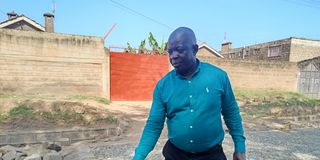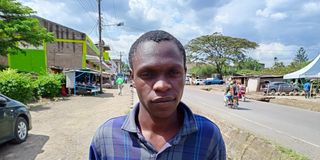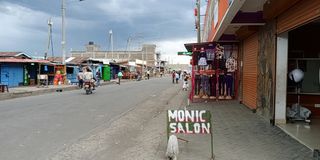The Evil Within: How drug abuse fans the flames of crime in Nakuru city

Hezron Okiki, a resident of Kaptembwa estate.
As we make our way through many of the informal settlements in Nakuru, we notice an interesting behaviour; youth seated in abandoned stalls chatting while others rest under the shade of a tree.
From a distance, we can hear the clack of billiard balls (balls used to play pool), mixing with cheers and jeers.
I am accompanied by an opinion leader in the area, my safe pass through these estates where visitors stick out like a sore thumb.
We finally meet Kevin Ongera at Gilani estate. He begins by admitting that many of his peers are jobless and therefore idle, hence spending most of their time playing pool and just sitting in abandoned stalls.

Kevin Ongera, a resident of Gilani estate.
"Illicit alcohol has taken root in our estate ruining the lives of many young people as they are now addicts, unable to function in the society," he says.
He continues to say that most of the youth who are jobless find themselves engaged in illegal activities to be able to finance their addictions.
Ann Mwangi* a vegetable vendor in the area confirms this, as she discreetly points towards a place that is known to be notorious of illicit brew.
She says that the places that sell this illicit brews are well known but there is nothing they can do because most of those who operate here are in collusion with the police.
"These activities usually take place in plain sight all through the day but there is nothing we can do about it. The same people who spend the whole day in these places are the ones who come in later in the evening to terrorize us," she reveals.
In Kaptembwa, the situation is quite similar. Here, we are shown a stall along stima line. From afar, one can think it’s a hotel operating in broad daylight.

A view of Kaptembwa estate.
Speaking to some of the residents, they say that the presence of the chang’aa den really bothers them but they are helpless because no action has been taken against the operators of the den, yet it is a place that is well known.
Hezron Okiki, a resident in the area, says many of the children who grow up in informal settlements experience a myriad of challenges and therefore the odds are usually stuck against them.
"There are those children who grow up in many of these informal settlements and are not even able to afford school fees so they end up staying at home. Over time, they find themselves engaging in drug and substance abuse since many of these drugs are easily accessible and sold in plain sight," he says.
Okiki explains that the selling of these illegal substances in many of the areas is something that has taken shape over time and therefore as these children grow up, they are easily inculcated into this culture.
"As we have often seen, once many of them start using some of these illegal drugs, they develop an addiction which means they would need to find ways to fund their habits. One of the ways to get quick money would be by engaging in crime" he notes.
Okiki concludes by saying that eradicating the illegal businesses in these areas would go a long way in ensuring that the crime rate reduces.


